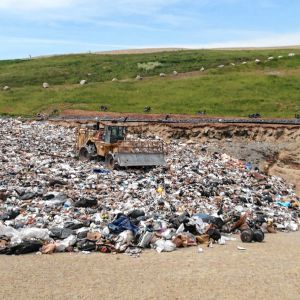Bill banning products made with PFAS moves forward

A refuse truck backs up to dump trash at the Nashua landfill earlier this month. Non-recycled waste, as well as waste generated in the state and waste from neighboring New England states such as Massachusetts, are disposed of in nine enormous landfills spread across the state. These modern-day landfills are engineered with safety in mind. They are lined with low-permeable materials to keep waste from contacting groundwater or soil. GEOFF FORESTER
| Published: 03-26-2024 5:43 PM |
Mattresses, feminine hygiene products, food packaging and several other everyday items with added forever chemicals, may face a potential ban as a bill prohibiting their sale and distribution in New Hampshire progresses forward to the House of Representatives.
Members of the House Finance Committee voted 15-9 on Tuesday in support of House Bill 1649, which prohibits consumer products that are intentionally added with per- and polyfluoroalkyl substances (PFAS) in New Hampshire. These substances are linked to several health risks, including cancer.
If the bill passes, the ban on products like carpets, products for children under 12, food packaging, feminine hygiene products, upholstered furniture, textile furnishings and treatments and personal protective equipment will take effect in July 2028.
A PFAS-added product is one in which a manufacturer uses the synthetic chemical for a functional or technical reason, such as making a product stain or adding water-resistance.
The cycle of these chemicals has almost no end, said Representative Karen Ebel, the bill’s prime sponsor.
Once products containing forever chemicals are used, they permeate into the soil, air and water. Even when disposed of in landfills, the resulting waste released carries these forever chemicals, which remain present even after treatment in wastewater plants, ultimately transforming into sludge. Although efforts are made to treat this sludge, the residue left behind finds its way back to landfills, and so on.
“You think about the unbelievable burden that the state of New Hampshire is already struggling with and our people are facing health care concerns and extreme costs, it makes every bit of sense not to keep using PFAS in our products, but to stop the problem at the source,” said Rep. Ebel at the session, stressing the importance of preventing exposure to children.
While recognizing the urgency prompted by the 2016 discovery of PFAS contamination in water from Merrimack’s Saint-Gobain Performance Plastics facility, many committee members remained hesitant to support the bill due to concerns about imposing a ban without enough research.
Article continues after...
Yesterday's Most Read Articles
 Casella Waste Systems’ landfill project in New Hampshire’s North Country denied permit
Casella Waste Systems’ landfill project in New Hampshire’s North Country denied permit
 ‘Less finger pointing, more communication’: Longtime Chichester residents share hopes before second town meeting
‘Less finger pointing, more communication’: Longtime Chichester residents share hopes before second town meeting
 ‘The revenue just isn’t there’: House Finance Committee slashes $271M in jobs, services from Ayotte’s budget proposal
‘The revenue just isn’t there’: House Finance Committee slashes $271M in jobs, services from Ayotte’s budget proposal
 12 Concord student-athletes sign on to play at the collegiate level
12 Concord student-athletes sign on to play at the collegiate level
 ‘There was no oversight’: NH child advocate has been a watchdog for children's care. Now, the office is on the chopping block
‘There was no oversight’: NH child advocate has been a watchdog for children's care. Now, the office is on the chopping block
 Volunteer group wants to help homeless clean up their camp
Volunteer group wants to help homeless clean up their camp
“What I think the Department of Environmental Services has set is unreasonable. They can't show me any real backup data other than rodents,” said Kenneth Wyler, the committee chair. “So I'm opposed to banning things before we have real data from humans.”
The legislation allocates $250,000 and the state is responsible for streamlining the process and getting the program running efficiently.
Representative Dan McGuire from Epsom expressed skepticism, stating that regulating products with just one employee from DES doesn't seem feasible.
“I mean, this is a feel-good kind of thing. It necessarily has to be selective enforcement,” he said, opposing the bill.
Representative Maureen Mooney from Merrimack emphasized urgent support for the bill, drawing from the experiences of her constituents grappling with the Saint-Gobain’s contamination.
“To this day, I have constituents on bottled water for bathing, cooking and drinking” said Mooney, highlighting the investments of both time and resources made by state agencies, town councils, and citizens in litigation and negotiation.“The only way to stop is to prohibit it and it starts with the bill.”







 Henniker ponders what is a ‘need’ and what is a ‘want’
Henniker ponders what is a ‘need’ and what is a ‘want’ Boscawen residents vote to fund major renovation of public works building
Boscawen residents vote to fund major renovation of public works building ‘Voting our wallets’: Loudon residents vote overwhelmingly against $1.7M bond for new fire truck
‘Voting our wallets’: Loudon residents vote overwhelmingly against $1.7M bond for new fire truck In Pembroke, Education Freedom Accounts draw debate, voters pass budget
In Pembroke, Education Freedom Accounts draw debate, voters pass budget
